牛津深圳版八年级英语上册课件Unit 6 Ancient stories (共31张PPT)
文档属性
| 名称 | 牛津深圳版八年级英语上册课件Unit 6 Ancient stories (共31张PPT) | 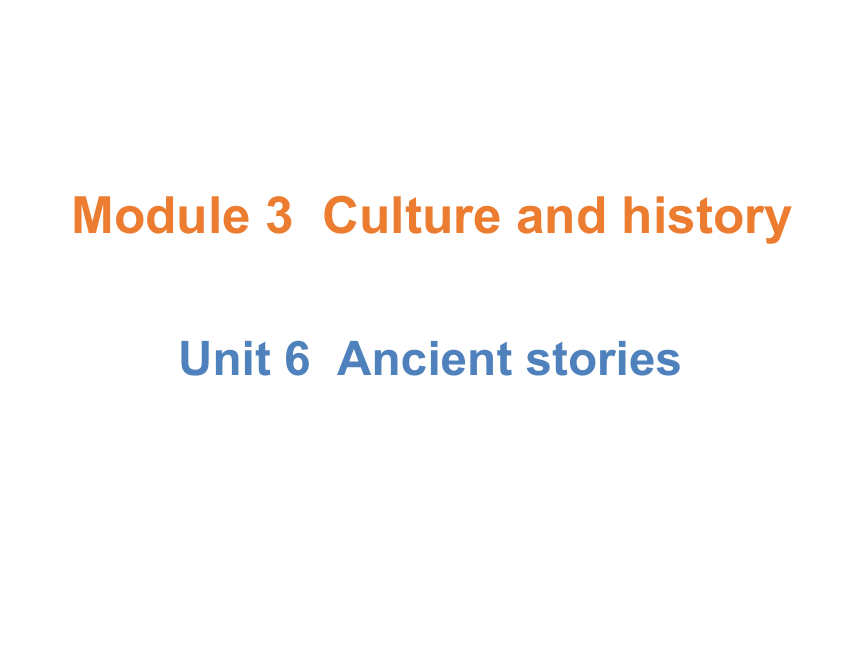 | |
| 格式 | zip | ||
| 文件大小 | 68.8KB | ||
| 资源类型 | 教案 | ||
| 版本资源 | 牛津深圳版 | ||
| 科目 | 英语 | ||
| 更新时间 | 2016-06-27 06:38:52 | ||
图片预览

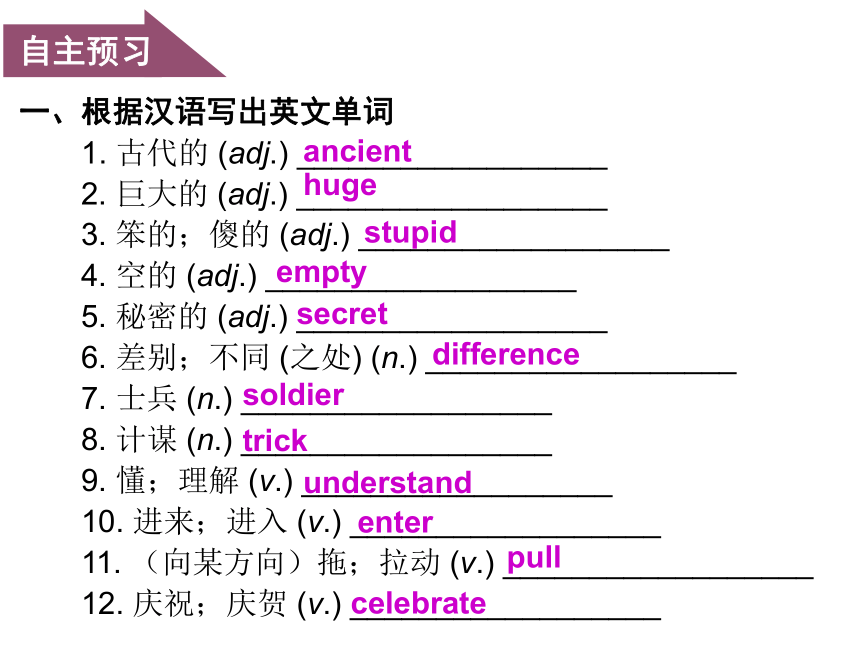
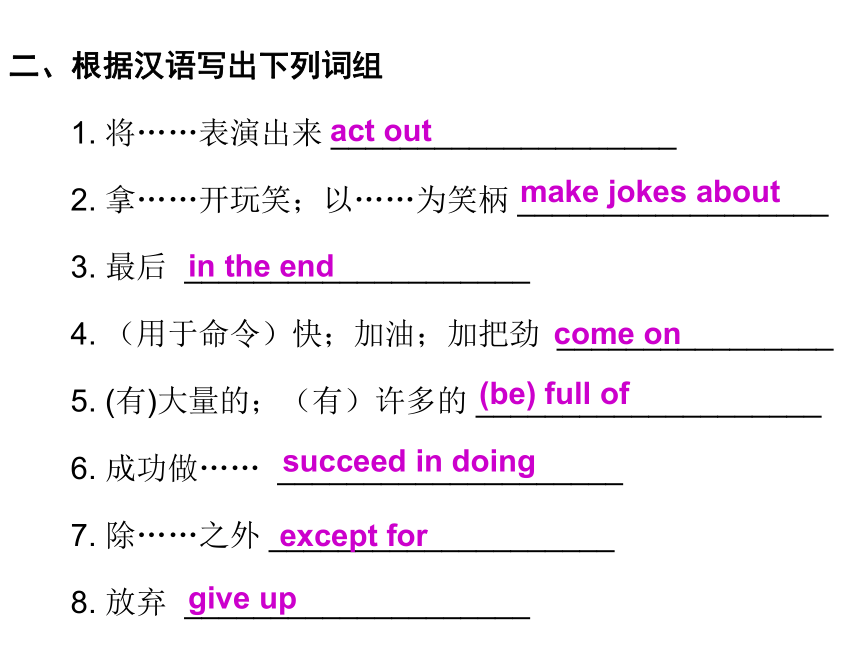
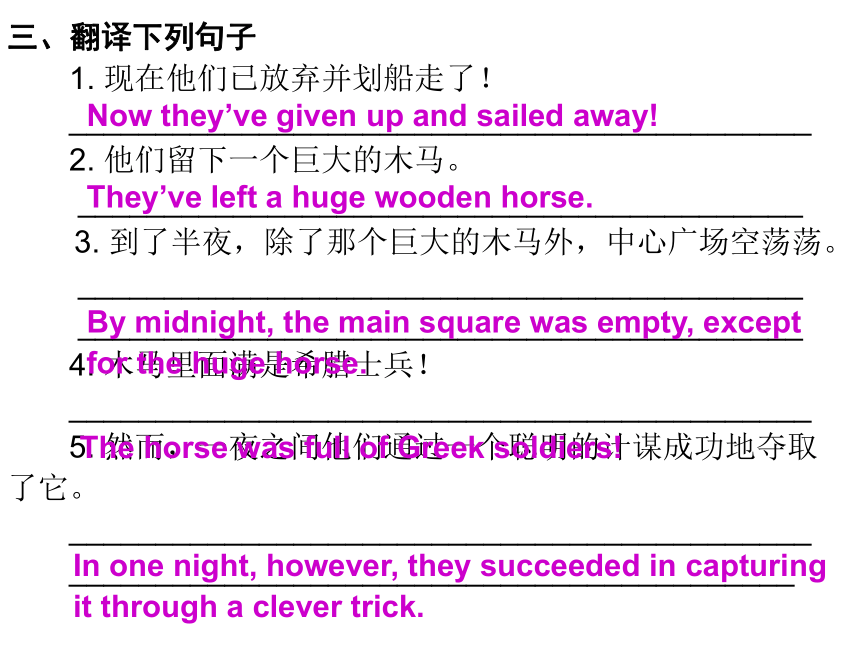
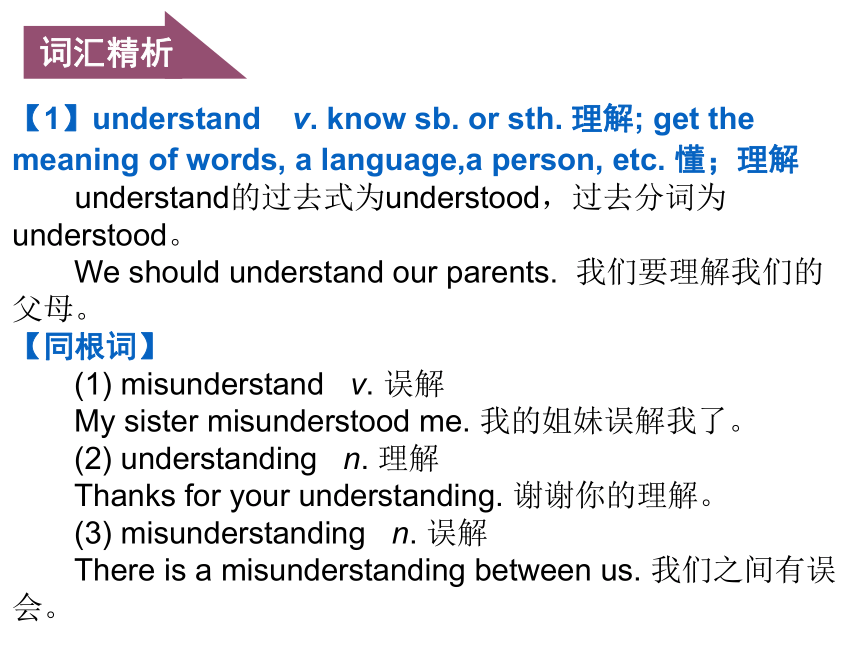
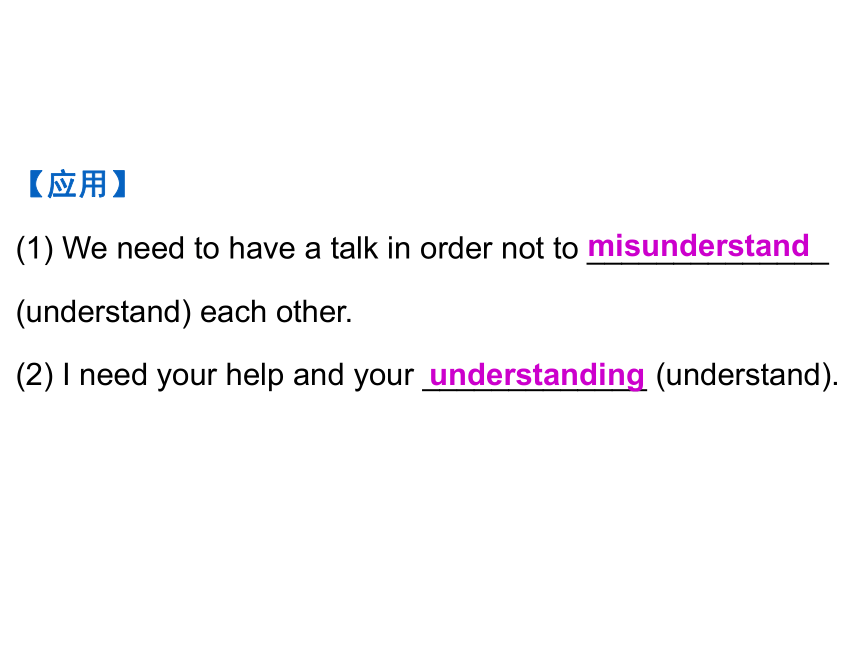
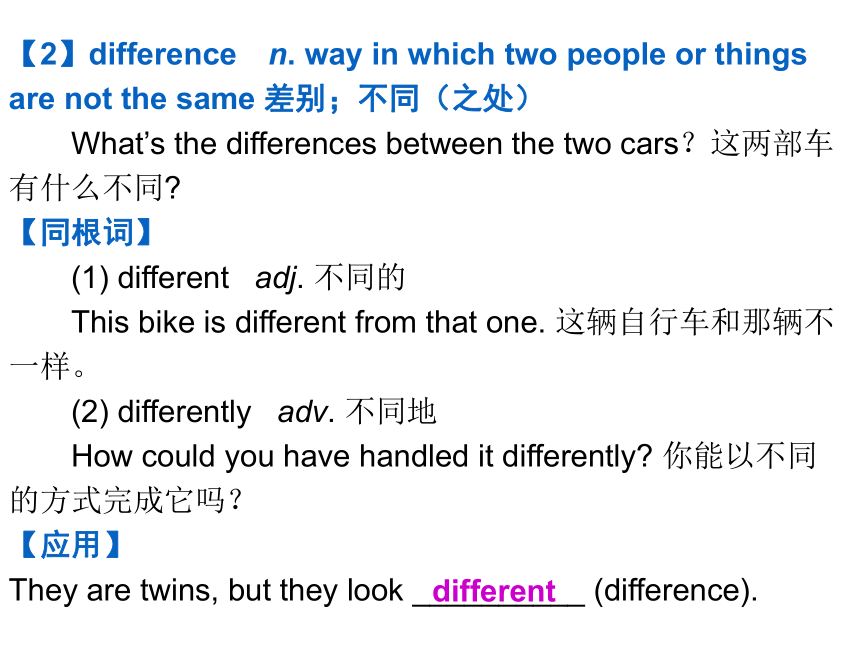
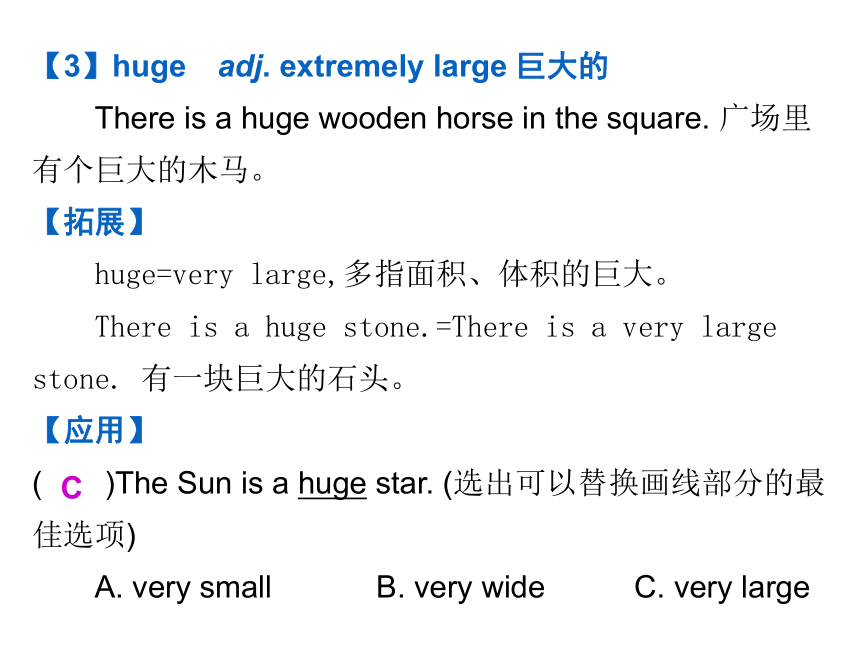
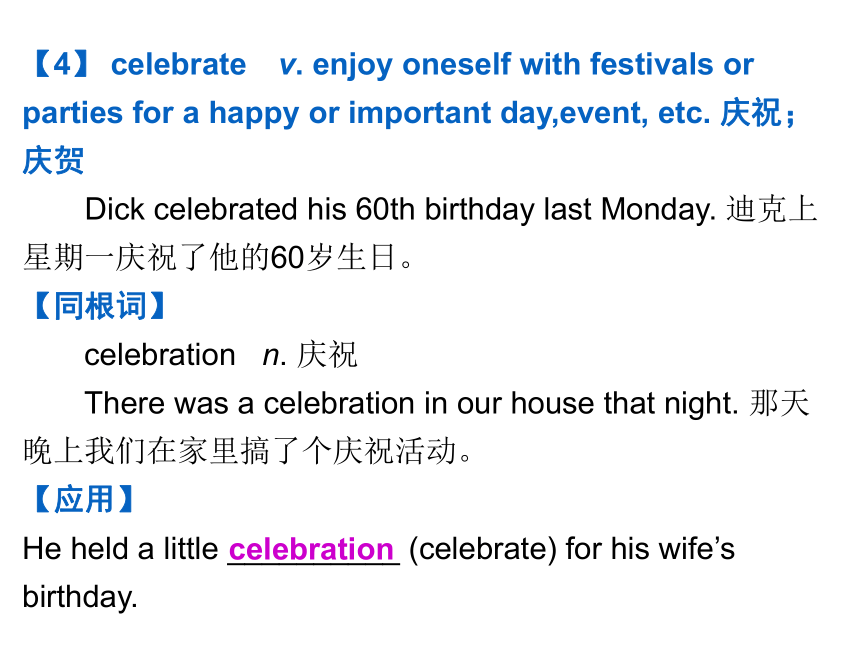
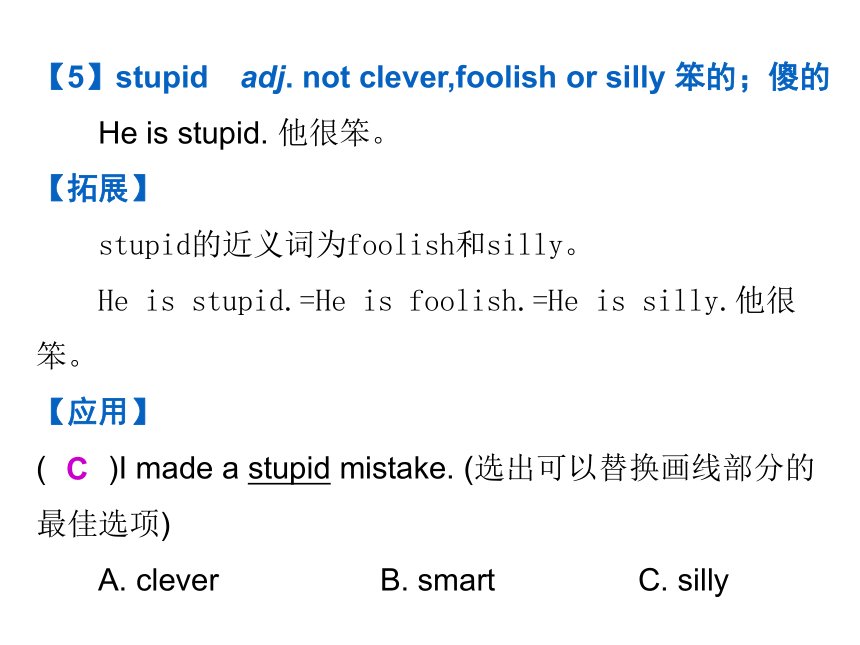
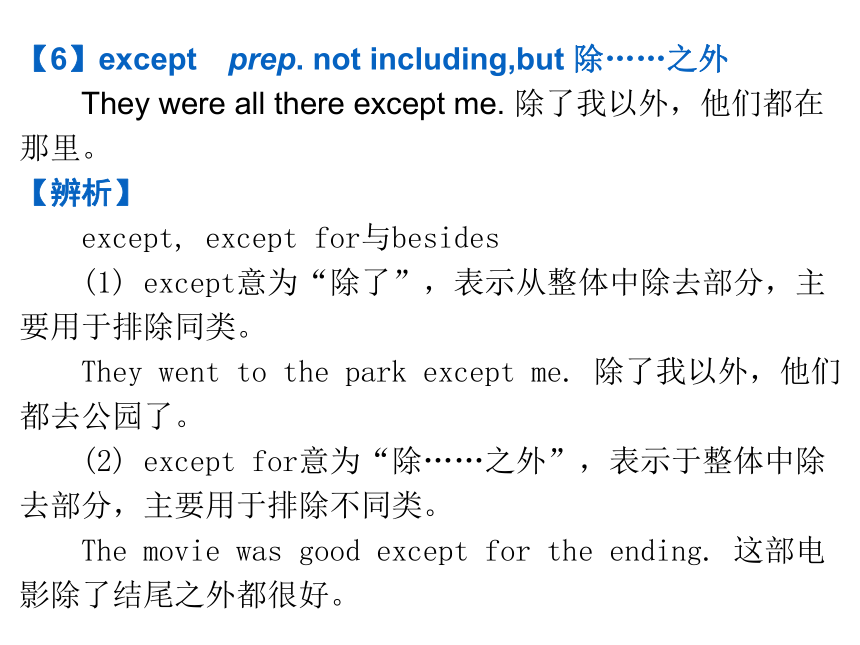
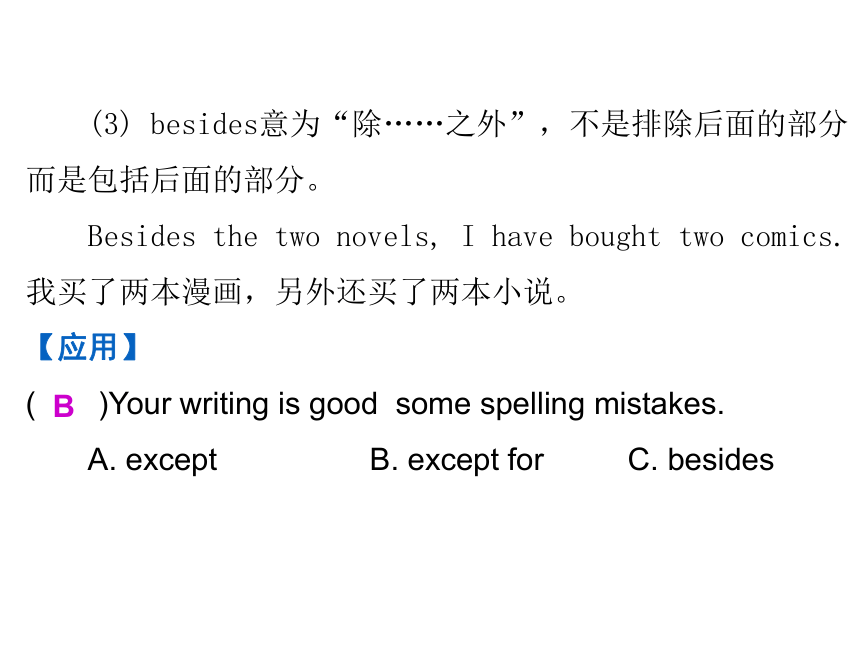
文档简介
课件31张PPT。Unit 6 Ancient storiesModule 3 Culture and history自主预习一、根据汉语写出英文单词
1. 古代的 (adj.) __________________
2. 巨大的 (adj.) __________________
3. 笨的;傻的 (adj.) __________________
4. 空的 (adj.) __________________
5. 秘密的 (adj.) __________________
6. 差别;不同 (之处) (n.) __________________
7. 士兵 (n.) __________________
8. 计谋 (n.) __________________
9. 懂;理解 (v.) __________________
10. 进来;进入 (v.) __________________
11. (向某方向)拖;拉动 (v.) __________________
12. 庆祝;庆贺 (v.) __________________ ancienthugestupidemptysecretdifferencesoldiertrickunderstandenterpullcelebrate二、根据汉语写出下列词组
1. 将……表演出来 ____________________
2. 拿……开玩笑;以……为笑柄 __________________
3. 最后 ____________________
4. (用于命令)快;加油;加把劲 ________________
5. (有)大量的;(有)许多的 ____________________
6. 成功做…… ____________________
7. 除……之外 ____________________
8. 放弃 ____________________act outmake jokes aboutin the endcome on(be) full ofsucceed in doingexcept forgive up三、翻译下列句子
1. 现在他们已放弃并划船走了!
___________________________________________
2. 他们留下一个巨大的木马。
__________________________________________
3. 到了半夜,除了那个巨大的木马外,中心广场空荡荡。
__________________________________________
__________________________________________
4. 木马里面满是希腊士兵!
___________________________________________
5. 然而,一夜之间他们通过一个聪明的计谋成功地夺取了它。
___________________________________________
__________________________________________Now they’ve given up and sailed away!They’ve left a huge wooden horse.By midnight, the main square was empty, except
for the huge horse. The horse was full of Greek soldiers!In one night, however, they succeeded in capturing
it through a clever trick.词汇精析【1】understand v. know sb. or sth. 理解; get the meaning of words, a language,a person, etc. 懂;理解
understand的过去式为understood,过去分词为understood。
We should understand our parents. 我们要理解我们的父母。
【同根词】
(1) misunderstand v. 误解
My sister misunderstood me. 我的姐妹误解我了。
(2) understanding n. 理解
Thanks for your understanding. 谢谢你的理解。
(3) misunderstanding n. 误解
There is a misunderstanding between us. 我们之间有误会。【应用】
(1) We need to have a talk in order not to ______________ (understand) each other.
(2) I need your help and your _____________ (understand).misunderstandunderstanding【2】difference n. way in which two people or things are not the same 差别;不同(之处)
What’s the differences between the two cars?这两部车有什么不同?
【同根词】
(1) different adj. 不同的
This bike is different from that one. 这辆自行车和那辆不一样。
(2) differently adv. 不同地
How could you have handled it differently? 你能以不同的方式完成它吗?
【应用】
They are twins, but they look __________ (difference).different【3】huge adj. extremely large 巨大的
There is a huge wooden horse in the square. 广场里有个巨大的木马。
【拓展】
huge=very large,多指面积、体积的巨大。
There is a huge stone.=There is a very large stone. 有一块巨大的石头。
【应用】
( )The Sun is a huge star. (选出可以替换画线部分的最佳选项)
A. very small B. very wide C. very large C【4】 celebrate v. enjoy oneself with festivals or parties for a happy or important day,event, etc. 庆祝;庆贺
Dick celebrated his 60th birthday last Monday. 迪克上星期一庆祝了他的60岁生日。
【同根词】
celebration n. 庆祝
There was a celebration in our house that night. 那天晚上我们在家里搞了个庆祝活动。
【应用】
He held a little __________ (celebrate) for his wife’s birthday. celebration【5】stupid adj. not clever,foolish or silly 笨的;傻的
He is stupid. 他很笨。
【拓展】
stupid的近义词为foolish和silly。
He is stupid.=He is foolish.=He is silly.他很
笨。
【应用】
( )I made a stupid mistake. (选出可以替换画线部分的最佳选项)
A. clever B. smart C. silly C【6】except prep. not including,but 除……之外
They were all there except me. 除了我以外,他们都在那里。
【辨析】
except, except for与besides
(1) except意为“除了”,表示从整体中除去部分,主要用于排除同类。
They went to the park except me. 除了我以外,他们都去公园了。
(2) except for意为“除……之外”,表示于整体中除去部分,主要用于排除不同类。
The movie was good except for the ending. 这部电影除了结尾之外都很好。 (3) besides意为“除……之外”,不是排除后面的部分而是包括后面的部分。
Besides the two novels, I have bought two comics. 我买了两本漫画,另外还买了两本小说。
【应用】
( )Your writing is good some spelling mistakes.
A. except B. except for C. besides B【7】secret adj. something is known about by only a small number of people, and is not told or shown to anyone else 秘密的
n. fact that is known by only a small number of people, and is not told to anyone else 秘密
There is a secret door. 有一扇秘密的门。
Don’t tell the secret to others. 不要把秘密告诉别人。【同根词】
secretly adv. 秘密地
He went abroad secretly. 他秘密地出国了。
【拓展】
keep the secret 保守秘密
You should keep our secret. 你要保守我们之间的秘密。
【应用】
They came into the city __________ (secret). secretly 【8】enter v. come or go in or into 进来;进入
He entered the office. 他进入了办公室。
【拓展】
(1) enter=go into
He entered the office.=He went into the office.
他进入了办公室。
(2) enter for=take part in 参加
He entered for/took part in the 100-metre race.
他参加了100米短跑比赛。【应用】
(1) ( )They entered the city secretly. (选出可以替换画线部分的最佳选项)
A. came out of B. arrived C. went into
(2) ( )They entered for the basketball game. (选出可以替换画线部分的最佳选项)
A. came out of B. arrived C. took part inCC【9】trick n. thing done in order to cheat or deceive sb. 计谋;统计
v. cheat or deceive sb. 欺骗
It is just a trick. 这只是个小伎俩。
【拓展】
play a trick on sb.=play jokes on sb. 捉弄某人
We should not play a trick on him.=We should not play jokes on him. 我们不应该捉弄他。
【应用】
( )It is impolite to play a trick on others. (选出可以替换画线部分的最佳选项)
A. play games with
B. play jokes on
C. play fun on B【10】steal v. take something secretly without permission or legal right 偷;窃取
steal的过去式和过去分词分别为stole, stolen。
He stole the crown. 他偷了皇冠。
【同根词】
stolen adj. 被偷走的
They found the stolen crown. 他们找到了被偷走的皇
冠。
【拓展】
steal sth.from... 从……偷走……
He stole a book from the bookshop. 他从书店偷走了一本书。【应用】
(1) The police finally found the __________ (steal) car.
(2) ( )The thief stole some money ______ the girl.
A. from B. for C. to stolenA【11】punish v. make sb. suffer in some way because they have done something wrong 处罚;惩罚
The king punished him. 国王惩罚了他。
【同根词】
punishment n. 惩罚
You will get punishment if you do something wrong. 如果你做错了事,就会受到惩罚的。
【应用】
Too much ____________ (punish) is useless. punishment【12】in the end=at last=finally 最后
In the end, we succeeded. 最后,我们胜利了。
【拓展】
in the end=at last=finally
In the end, we succeeded.
=At last, we succeeded.
=Finally, we succeeded.最后,我们胜利了。
【应用】
( )They calmed down in the end. (选出可以替换画线部分的最佳选项)
A. final B. at last C. at first B语法梳理语法精讲现在完成时(二)
1.带有since和for的现在完成时
(1)我们可以在现在完成时的动词后加since+时间点或for+时间段。注意,只有持续性动词才能接since和for引导的时间短语,如live,keep,have等;短暂性动词则不能,如buy, borrow, die, join等。
I have lived here for ten years.我住在这里有10年了。
She has studied in this school since 2010.她从2010年开始就在这所学校中学习。
He has bought the bike for a week.他买这辆自行车有一个礼拜了。(错误,bought应改为had)
She has borrowed the book for two days.她借这本书两天了。(错误,borrowed应改为kept) (2)常见的短暂性动词与持续性动词间的转换。
buy→have
borrow→keep
die→be dead
open→be open
close→be closed
join→be in
begin/start→be on
go/leave→be away
finish/stop/end→be over
arrive/get to/come/reach→be in 2. 现在完成时和一般过去时的区别
我们用现在完成时来描述过去发生的且对现在产生影响的事情;而一般过去时则只表示过去发生的事实。
I have studied History for two years. 我学了两年的历史了。
I had a History lesson yesterday. 我昨天上了历史课。
I have learnt a lot about Greek history. 我学了很多希腊历史。
I read the story about the Trojan War last week. 我上个星期读了个关于特洛伊战争的故事。直击中考( )1. —Have you ever ______ an amusement park?
—Yes, I have. I ______ Fun Times Amusement Park last year. (2014达州)
A. been to; have gone to
B. gone to; have been to
C. go to; went to
D. been to; went toD( )2. —Are you going anywhere?
—I ______ about visiting my sister, but I have changed my mind. (2014河南)
A. think B. have thought
C. will think D. thought
( )3. I ______ my home town for a long time. I really miss it. (2014黔西南州)
A. left B. went away from
C. have left D. have been away from DD写作乐园话题六 描述特洛伊战争
【常用词组】
1. leave sth.留下某物
2. make mistakes 犯错误
3. pull...into把……拉进来
4. go to sleep去睡觉
5. be full of充满了
6. climb out of从……爬出来
7. one by one一个接一个
8. in one night一夜之间
9. succeed in doing sth.成功做某事【精彩句型】
1. We made a big mistake. 我们犯了个大错误。
2. The huge wooden horse was full of Greek soldiers.巨大的木马里满是希腊士兵。
3. After the party, we locked all the gates of the city and went to sleep. 晚会之后,我们锁了所有城门然后就去睡觉了。
4. They climbed out of the horse one by one secretly. 他们一个接一个偷偷地爬出木马。
5. In one night, they succeeded in capturing the city through a clever trick. 一夜之间,他们通过一个聪明的计谋成功夺取了城市。【短文写作】
假设你是特洛伊战争中的一名士兵, 多年后,你向你的家人讲述那晚发生的事情。请根据下面的提示,就此写一篇短文。
提示:
1. 我们拉木马进广场;
2. 我们在广场庆祝;
3. 希腊士兵从木马中爬出来;
4. 他们打开城门,并夺取了城市。
要求:语意连贯,条理清晰,不少于70词。【范文赏析】
The Greeks left a huge wooden horse outside our main gate. We made a big mistake. We pulled it into the square and celebrated at night. After the party, we locked all the gates of the city and went to sleep. We didn’t know that the huge wooden horse was full of Greek soldiers. They climbed out of the horse one by one secretly. Then, they opened the main gates of the city and the Greek army entered the city. In one night, they succeeded in capturing the city through a clever trick.谢谢欣赏!
1. 古代的 (adj.) __________________
2. 巨大的 (adj.) __________________
3. 笨的;傻的 (adj.) __________________
4. 空的 (adj.) __________________
5. 秘密的 (adj.) __________________
6. 差别;不同 (之处) (n.) __________________
7. 士兵 (n.) __________________
8. 计谋 (n.) __________________
9. 懂;理解 (v.) __________________
10. 进来;进入 (v.) __________________
11. (向某方向)拖;拉动 (v.) __________________
12. 庆祝;庆贺 (v.) __________________ ancienthugestupidemptysecretdifferencesoldiertrickunderstandenterpullcelebrate二、根据汉语写出下列词组
1. 将……表演出来 ____________________
2. 拿……开玩笑;以……为笑柄 __________________
3. 最后 ____________________
4. (用于命令)快;加油;加把劲 ________________
5. (有)大量的;(有)许多的 ____________________
6. 成功做…… ____________________
7. 除……之外 ____________________
8. 放弃 ____________________act outmake jokes aboutin the endcome on(be) full ofsucceed in doingexcept forgive up三、翻译下列句子
1. 现在他们已放弃并划船走了!
___________________________________________
2. 他们留下一个巨大的木马。
__________________________________________
3. 到了半夜,除了那个巨大的木马外,中心广场空荡荡。
__________________________________________
__________________________________________
4. 木马里面满是希腊士兵!
___________________________________________
5. 然而,一夜之间他们通过一个聪明的计谋成功地夺取了它。
___________________________________________
__________________________________________Now they’ve given up and sailed away!They’ve left a huge wooden horse.By midnight, the main square was empty, except
for the huge horse. The horse was full of Greek soldiers!In one night, however, they succeeded in capturing
it through a clever trick.词汇精析【1】understand v. know sb. or sth. 理解; get the meaning of words, a language,a person, etc. 懂;理解
understand的过去式为understood,过去分词为understood。
We should understand our parents. 我们要理解我们的父母。
【同根词】
(1) misunderstand v. 误解
My sister misunderstood me. 我的姐妹误解我了。
(2) understanding n. 理解
Thanks for your understanding. 谢谢你的理解。
(3) misunderstanding n. 误解
There is a misunderstanding between us. 我们之间有误会。【应用】
(1) We need to have a talk in order not to ______________ (understand) each other.
(2) I need your help and your _____________ (understand).misunderstandunderstanding【2】difference n. way in which two people or things are not the same 差别;不同(之处)
What’s the differences between the two cars?这两部车有什么不同?
【同根词】
(1) different adj. 不同的
This bike is different from that one. 这辆自行车和那辆不一样。
(2) differently adv. 不同地
How could you have handled it differently? 你能以不同的方式完成它吗?
【应用】
They are twins, but they look __________ (difference).different【3】huge adj. extremely large 巨大的
There is a huge wooden horse in the square. 广场里有个巨大的木马。
【拓展】
huge=very large,多指面积、体积的巨大。
There is a huge stone.=There is a very large stone. 有一块巨大的石头。
【应用】
( )The Sun is a huge star. (选出可以替换画线部分的最佳选项)
A. very small B. very wide C. very large C【4】 celebrate v. enjoy oneself with festivals or parties for a happy or important day,event, etc. 庆祝;庆贺
Dick celebrated his 60th birthday last Monday. 迪克上星期一庆祝了他的60岁生日。
【同根词】
celebration n. 庆祝
There was a celebration in our house that night. 那天晚上我们在家里搞了个庆祝活动。
【应用】
He held a little __________ (celebrate) for his wife’s birthday. celebration【5】stupid adj. not clever,foolish or silly 笨的;傻的
He is stupid. 他很笨。
【拓展】
stupid的近义词为foolish和silly。
He is stupid.=He is foolish.=He is silly.他很
笨。
【应用】
( )I made a stupid mistake. (选出可以替换画线部分的最佳选项)
A. clever B. smart C. silly C【6】except prep. not including,but 除……之外
They were all there except me. 除了我以外,他们都在那里。
【辨析】
except, except for与besides
(1) except意为“除了”,表示从整体中除去部分,主要用于排除同类。
They went to the park except me. 除了我以外,他们都去公园了。
(2) except for意为“除……之外”,表示于整体中除去部分,主要用于排除不同类。
The movie was good except for the ending. 这部电影除了结尾之外都很好。 (3) besides意为“除……之外”,不是排除后面的部分而是包括后面的部分。
Besides the two novels, I have bought two comics. 我买了两本漫画,另外还买了两本小说。
【应用】
( )Your writing is good some spelling mistakes.
A. except B. except for C. besides B【7】secret adj. something is known about by only a small number of people, and is not told or shown to anyone else 秘密的
n. fact that is known by only a small number of people, and is not told to anyone else 秘密
There is a secret door. 有一扇秘密的门。
Don’t tell the secret to others. 不要把秘密告诉别人。【同根词】
secretly adv. 秘密地
He went abroad secretly. 他秘密地出国了。
【拓展】
keep the secret 保守秘密
You should keep our secret. 你要保守我们之间的秘密。
【应用】
They came into the city __________ (secret). secretly 【8】enter v. come or go in or into 进来;进入
He entered the office. 他进入了办公室。
【拓展】
(1) enter=go into
He entered the office.=He went into the office.
他进入了办公室。
(2) enter for=take part in 参加
He entered for/took part in the 100-metre race.
他参加了100米短跑比赛。【应用】
(1) ( )They entered the city secretly. (选出可以替换画线部分的最佳选项)
A. came out of B. arrived C. went into
(2) ( )They entered for the basketball game. (选出可以替换画线部分的最佳选项)
A. came out of B. arrived C. took part inCC【9】trick n. thing done in order to cheat or deceive sb. 计谋;统计
v. cheat or deceive sb. 欺骗
It is just a trick. 这只是个小伎俩。
【拓展】
play a trick on sb.=play jokes on sb. 捉弄某人
We should not play a trick on him.=We should not play jokes on him. 我们不应该捉弄他。
【应用】
( )It is impolite to play a trick on others. (选出可以替换画线部分的最佳选项)
A. play games with
B. play jokes on
C. play fun on B【10】steal v. take something secretly without permission or legal right 偷;窃取
steal的过去式和过去分词分别为stole, stolen。
He stole the crown. 他偷了皇冠。
【同根词】
stolen adj. 被偷走的
They found the stolen crown. 他们找到了被偷走的皇
冠。
【拓展】
steal sth.from... 从……偷走……
He stole a book from the bookshop. 他从书店偷走了一本书。【应用】
(1) The police finally found the __________ (steal) car.
(2) ( )The thief stole some money ______ the girl.
A. from B. for C. to stolenA【11】punish v. make sb. suffer in some way because they have done something wrong 处罚;惩罚
The king punished him. 国王惩罚了他。
【同根词】
punishment n. 惩罚
You will get punishment if you do something wrong. 如果你做错了事,就会受到惩罚的。
【应用】
Too much ____________ (punish) is useless. punishment【12】in the end=at last=finally 最后
In the end, we succeeded. 最后,我们胜利了。
【拓展】
in the end=at last=finally
In the end, we succeeded.
=At last, we succeeded.
=Finally, we succeeded.最后,我们胜利了。
【应用】
( )They calmed down in the end. (选出可以替换画线部分的最佳选项)
A. final B. at last C. at first B语法梳理语法精讲现在完成时(二)
1.带有since和for的现在完成时
(1)我们可以在现在完成时的动词后加since+时间点或for+时间段。注意,只有持续性动词才能接since和for引导的时间短语,如live,keep,have等;短暂性动词则不能,如buy, borrow, die, join等。
I have lived here for ten years.我住在这里有10年了。
She has studied in this school since 2010.她从2010年开始就在这所学校中学习。
He has bought the bike for a week.他买这辆自行车有一个礼拜了。(错误,bought应改为had)
She has borrowed the book for two days.她借这本书两天了。(错误,borrowed应改为kept) (2)常见的短暂性动词与持续性动词间的转换。
buy→have
borrow→keep
die→be dead
open→be open
close→be closed
join→be in
begin/start→be on
go/leave→be away
finish/stop/end→be over
arrive/get to/come/reach→be in 2. 现在完成时和一般过去时的区别
我们用现在完成时来描述过去发生的且对现在产生影响的事情;而一般过去时则只表示过去发生的事实。
I have studied History for two years. 我学了两年的历史了。
I had a History lesson yesterday. 我昨天上了历史课。
I have learnt a lot about Greek history. 我学了很多希腊历史。
I read the story about the Trojan War last week. 我上个星期读了个关于特洛伊战争的故事。直击中考( )1. —Have you ever ______ an amusement park?
—Yes, I have. I ______ Fun Times Amusement Park last year. (2014达州)
A. been to; have gone to
B. gone to; have been to
C. go to; went to
D. been to; went toD( )2. —Are you going anywhere?
—I ______ about visiting my sister, but I have changed my mind. (2014河南)
A. think B. have thought
C. will think D. thought
( )3. I ______ my home town for a long time. I really miss it. (2014黔西南州)
A. left B. went away from
C. have left D. have been away from DD写作乐园话题六 描述特洛伊战争
【常用词组】
1. leave sth.留下某物
2. make mistakes 犯错误
3. pull...into把……拉进来
4. go to sleep去睡觉
5. be full of充满了
6. climb out of从……爬出来
7. one by one一个接一个
8. in one night一夜之间
9. succeed in doing sth.成功做某事【精彩句型】
1. We made a big mistake. 我们犯了个大错误。
2. The huge wooden horse was full of Greek soldiers.巨大的木马里满是希腊士兵。
3. After the party, we locked all the gates of the city and went to sleep. 晚会之后,我们锁了所有城门然后就去睡觉了。
4. They climbed out of the horse one by one secretly. 他们一个接一个偷偷地爬出木马。
5. In one night, they succeeded in capturing the city through a clever trick. 一夜之间,他们通过一个聪明的计谋成功夺取了城市。【短文写作】
假设你是特洛伊战争中的一名士兵, 多年后,你向你的家人讲述那晚发生的事情。请根据下面的提示,就此写一篇短文。
提示:
1. 我们拉木马进广场;
2. 我们在广场庆祝;
3. 希腊士兵从木马中爬出来;
4. 他们打开城门,并夺取了城市。
要求:语意连贯,条理清晰,不少于70词。【范文赏析】
The Greeks left a huge wooden horse outside our main gate. We made a big mistake. We pulled it into the square and celebrated at night. After the party, we locked all the gates of the city and went to sleep. We didn’t know that the huge wooden horse was full of Greek soldiers. They climbed out of the horse one by one secretly. Then, they opened the main gates of the city and the Greek army entered the city. In one night, they succeeded in capturing the city through a clever trick.谢谢欣赏!
